-
RESEARCH01-01-2017
Health education with older adults: action research with primary care professionals
Revista Brasileira de Enfermagem. 2017;70(4):792-799
Abstract
RESEARCHHealth education with older adults: action research with primary care professionals
Revista Brasileira de Enfermagem. 2017;70(4):792-799
DOI 10.1590/0034-7167-2016-0349
Views0See moreABSTRACT
Objective:
To assess the development and implementation of permanent education action.
Method:
Quantitative-qualitative research based on action research in three phases (diagnosis of reality, implementation of activity and evaluation), performed with health professionals and managers of basic health units. The evaluation was on the perception of changes immediately following the activity and after 120 days.
Results:
In the first phase, 110 professionals took part, 36.4% of whom indicated the existence of groups for older adults at work. In the second phase, 98 professionals participated, pointing out interferences of the group in the life of older adults, items of importance and facilitation in forming groups and developing reality-based activities. The third phase showed, in the quantitative analysis, positive impact of the training, and in the qualitative analysis, reassessment of groups, greater knowledge and confidence in managing groups and increased respect for older adults.
Final considerations:
Permanent education opens pathways for the construction of differentiated care for older adults based on respect and health promotion.

-
RESEARCH01-01-2017
Older adults abuse in three Brazilian cities
Revista Brasileira de Enfermagem. 2017;70(4):783-791
Abstract
RESEARCHOlder adults abuse in three Brazilian cities
Revista Brasileira de Enfermagem. 2017;70(4):783-791
DOI 10.1590/0034-7167-2017-0114
Views0See moreABSTRACT
Objective:
To analyze the police reports filed by older adults who suffered abuse in order to identify the socio-demographic characteristics of victims and aggressors, type of violence, location, as well as to compare rates in three Brazilian cities in the period from 2009 to 2013.
Method:
Ecological study, in which 2,612 police reports registered in Police Stations were analyzed. An instrument was used to obtain data from the victim, the aggressor and the type of violence.
Results:
Psychological abuse predominated and most cases occurred in the older adults own home. In the cities of Ribeirão Preto and João Pessoa, the older adults presented similar rates for both gender. Regarding the standardized rates, in João Pessoa, there was a rise of this type of abuse in the two first years, and later there was a certain stability. In the city of Teresina, there was an increase, also observed in the city of Ribeirão Preto in the three first years, followed by a decrease.
Conclusion:
Older adults abuse is a cultural phenomenon difficult to be reported by them, since it occurs in the family context.

-
RESEARCH01-01-2017
Validation of educational booklet for HIV/Aids prevention in older adults
Revista Brasileira de Enfermagem. 2017;70(4):775-782
Abstract
RESEARCHValidation of educational booklet for HIV/Aids prevention in older adults
Revista Brasileira de Enfermagem. 2017;70(4):775-782
DOI 10.1590/0034-7167-2017-0145
Views0See moreABSTRACT
Objective:
To describe the process of manufacturing and validation of an educational booklet for HIV/Aids prevention in older adults
Methods:
Methodological study developed in two phases – manufacturing of the booklet and validation of the educational material by judges. The manufacturing process involved a situational diagnosis with older adults, and its result indicated gaps in the knowledge with respect to HIV/Aids. The validation process was performed by nine judges, selected by convenience. It was considered an agreement index of at least 0.80, analyzed through the content validity index.
Results:
We opted for a dialogue between two older adults divided into three categories: myths and taboos; ignorance; and prevention and importance of diagnosis. The average of the items was 0.90. The suggestions made by the judges were observed and modified for the final version.
Conclusion:
The material had relevant content for the judges, in addition to being able to be used by health professionals in the education and clarification of issues on the subject.

-
RESEARCH01-01-2017
Association between filial responsibility when caring for parents and the caregivers overload
Revista Brasileira de Enfermagem. 2017;70(4):767-774
Abstract
RESEARCHAssociation between filial responsibility when caring for parents and the caregivers overload
Revista Brasileira de Enfermagem. 2017;70(4):767-774
DOI 10.1590/0034-7167-2017-0133
Views0See moreABSTRACT
Objective:
To analyze the association between filial responsibility and the overload of the children when caring for their older parents.
Method:
Cross-sectional study with 100 caregiver children of older adults. Filial liability was assessed by the attitudes of the responsible child (scale of expectation and filial duty) and by care behaviors (assistance in activities of daily living, emotional and financial support, and keeping company). The overload was assessed by the Caregiver Burden Inventory. To assess the associations, the correlation coefficients of Pearson and Spearman, Kruskal-Wallis Test, and Mann-Whitney were employed. Variables that presented p-value<0.20 in the bivariate analysis were inserted in a multivariate linear regression model.
Results:
The factors associated with overload were: formal employment (p=0.002), feelings regarding family life (p<0.001), financial support (p=0.027), and assistance with Activities of Daily Living (ADLs) (p<0.001).
Conclusion:
Children who were more involved with the ADLs and provided financial support showed higher levels of overload.
-
RESEARCH01-01-2017
Religiosity and spirituality as resilience strategies among long-living older adults in their daily lives
Revista Brasileira de Enfermagem. 2017;70(4):761-766
Abstract
RESEARCHReligiosity and spirituality as resilience strategies among long-living older adults in their daily lives
Revista Brasileira de Enfermagem. 2017;70(4):761-766
DOI 10.1590/0034-7167-2016-0630
Views0See moreABSTRACT
Objective:
to investigate religiosity and spirituality as a resilience strategy for the long-living older adults in their daily lives.
Method:
Qualitative research of phenomenological approach based on Martin Heidegger thoughts. Interviews were conducted with 14 older adults registered at a family health unit in the city of Jequié, BA, Brazil. The data were analyzed in the light of Being and Time.
Results:
The results revealed that God occupies a central position in their lives, and the reading of the bible, praying the rosary and prayers are resilience strategies used for coping with unfavorable situations, recovery and/or maintenance of health, personal and family protection, and, above all, the experience of a satisfactory aging.
Final considerations:
Religiosity and spirituality were presented as an important resilience strategy in the existence of older adults, showing that through them it is possible to achieve well-being and cope with health and social problems.

-
RESEARCH01-01-2017
Family of older adults with mental disorder: perception of mental health professionals
Revista Brasileira de Enfermagem. 2017;70(4):753-760
Abstract
RESEARCHFamily of older adults with mental disorder: perception of mental health professionals
Revista Brasileira de Enfermagem. 2017;70(4):753-760
DOI 10.1590/0034-7167-2016-0646
Views0See moreABSTRACT
Objective:
to understand the perceptions of healthcare professionals of the Psychosocial Care Centers regarding the family of older adults with mental disorders.
Method:
study of a Qualitative Case conducted with 12 healthcare professionals from a Psychosocial Care Center, with a convenient and exhaustive sample. Conducting semi-structured interviews to collect data, which were analyzed with the Content Analysis technique.
Results:
the following categories stood out: “Family exhaustion and deterioration in the perception of the healthcare professional” and “The abandonment of older adults by family members and their distancing in the perception of the healthcare professional.”
Final considerations:
culpability of older adults and penalization of the family were verified by healthcare professionals. To bring awareness about the difficulties faced in the attempt to bring the family closer to the healthcare service, it is necessary to analyze the care given to the older adult and to overcome challenges in the effective construction of the bond between family, healthcare user and mental health service.
-
RESEARCH01-01-2017
Frailty in the elderly: prevalence and associated factors
Revista Brasileira de Enfermagem. 2017;70(4):747-752
Abstract
RESEARCHFrailty in the elderly: prevalence and associated factors
Revista Brasileira de Enfermagem. 2017;70(4):747-752
DOI 10.1590/0034-7167-2016-0633
Views0See moreABSTRACT
Objective:
to know the prevalence and factors associated with frailty in elderly assisted by the Centro Mais Vida de Referência em Assistência à Saúde do Idoso (Mais Vida Health Reference Center for the Elderly) in the North of Minas Gerais, Brazil.
Method:
cross-sectional study, with sampling by convenience. Data collection occurred in 2015. Demographic and socioeconomic variables, morbidities, use of health services and the score of the Edmonton Frail Scale were analyzed. The adjusted prevalence ratios were obtained by multiple analysis of Poisson regression with robust variance.
Results:
360 elderly aged 65 or older were evaluated. Frailty prevalence was 47.2%. The variables associated with frailty were the following: advanced age elderly, who live without a partner, have a caregiver, present depressive symptoms, osteoarticular disease, as well as history of hospitalization and falls in the last twelve months.
Conclusion:
knowledge of factors associated with frailty allows development of health actions aimed at the elderly.
-
RESEARCH01-01-2017
Falls in long-term care institutions for elderly people: protocol validation
Revista Brasileira de Enfermagem. 2017;70(4):740-746
Abstract
RESEARCHFalls in long-term care institutions for elderly people: protocol validation
Revista Brasileira de Enfermagem. 2017;70(4):740-746
DOI 10.1590/0034-7167-2017-0109
Views1See moreABSTRACT
Objectives:
To validate the content of a fall management risk protocol in long-term institutions for elderly people.
Methods:
Methodological, quanti-qualitative study using the Delphi technique. The tool, based on the literature, was sent electronically to obtain consensus among the 14 experts that meet the defined inclusion criteria.
Results:
The 27 indicators of the protocol are organized in three dimensions: prepare for the institutionalization (IRA=.88); manage the risk of falls throughout the institutionalization (IRA=.9); and lead the communication and formation (IRA=1), with a CVI=.91. Two rounds were performed to get a consensus superior to 80% in every item.
Conclusion:
The values obtained in the reliability test (>0.8) show that the protocol can be used to meet the intended goal. The next step is the clinic validation of the protocol with residents of long-term care institutions for elderly people.
-
ORIGINAL ARTICLE09-26-2022
Educational technology for infants’ families to identify warning signs: a validation study
Revista Brasileira de Enfermagem. 2022;75(5):e20210964
Abstract
ORIGINAL ARTICLEEducational technology for infants’ families to identify warning signs: a validation study
Revista Brasileira de Enfermagem. 2022;75(5):e20210964
DOI 10.1590/0034-7167-2021-0964
Views0See moreABSTRACT
Objective:
To validate, with the target audience, the usability and appearance of a serialized album about the warning signs to the health of children below 2 months.
Method:
Methodological validation study with the target population of an educational material in the form of a serialized album. 11 mothers with children under 2 months of age participated. The domains evaluated were: Objectives, Organization, Writing Style, Appearance, and Motivation. Data were analyzed using descriptive and statistics, and the data agreement index was calculated.
Results:
The global data agreement index was high (0.99). Mothers had positive responses, recognizing the excellence of the material: attractive figures that were easy to understand.
Conclusion:
The validation of the serialized album provides mothers with the abilities and knowledge they need to identify warning signs in regard to the health of their children, providing them with autonomy, corresponsibility, and helping them develop better child health practices.
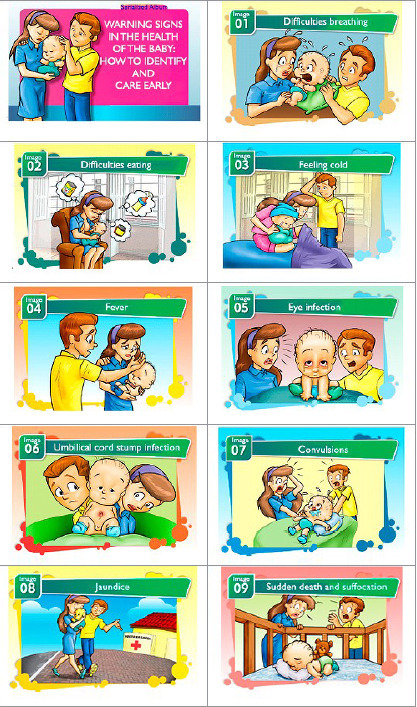
-
ORIGINAL ARTICLE10-17-2022
Validation of the Brazilian Portuguese version of the Venous International Assessment Scale and proposal of revision
Revista Brasileira de Enfermagem. 2022;75(5):e20220100
Abstract
ORIGINAL ARTICLEValidation of the Brazilian Portuguese version of the Venous International Assessment Scale and proposal of revision
Revista Brasileira de Enfermagem. 2022;75(5):e20220100
DOI 10.1590/0034-7167-2022-0100
Views0See moreABSTRACT
Objective:
To validate the Brazilian Portuguese translation and analyze the cultural adaptation of the Venous International Assessment Scale.
Methods:
Observational study by employing the Delphi technique and an equivalence evaluation by experts. The results were analyzed using item scores and by content validity index calculations of item, scale, and universal agreement.
Results:
Three rounds of evaluation were necessary for consensus. Explanatory contents were incorporated into the original scale throughout the process, resulting in a new version: VIA Scale – Revised. This scale obtained a content validity index of 0.96 and a universal agreement of 0.78. In the cross-cultural adequacy analysis phase, a score of 0.77 was obtained. The majority (90.5%) of the participants judged the scale’s decision support property as positive.
Conclusion:
The VIA Scale was validated and culturally adapted to the Brazilian Portuguese language, resulting in the VIA Scale – Revised (VIA-R).
-
ORIGINAL ARTICLE07-29-2022
Effects of guided imagery relaxation in hematopoietic stem-cell transplantation patients: a quasi-experimental study
Revista Brasileira de Enfermagem. 2022;75(5):e20220114
Abstract
ORIGINAL ARTICLEEffects of guided imagery relaxation in hematopoietic stem-cell transplantation patients: a quasi-experimental study
Revista Brasileira de Enfermagem. 2022;75(5):e20220114
DOI 10.1590/0034-7167-2022-0114
Views1See moreABSTRACT
Objective:
To analyze the effects of the technique of virtual reality guided imagery in the vital signs of hematopoietic stem-cell transplantation patients.
Method:
Quasi-experimental study with 35 participants who received an intervention using virtual reality guided imagery with progressive muscle relaxation, applied three times a week for four weeks in a referral hospital for transplants in the south of Brazil. Data collected included: temperature, arterial pressure, respiratory rate, heart rate, pain, and oxygen saturation, before and after each intervention. The comparisons were analyzed using Wilcoxon’s test.
Results:
There was a clinical significance between the mean measurements before and after for respiratory rate (p=0.00) in all stages, and for the variables Heart rate, Temperature, and Oxygen saturation from the 1st to the 12th measurements (p=0.05).
Conclusion:
The intervention was low cost, easy to apply, and showed positive effects, presenting itself as an option for patient-focused care.
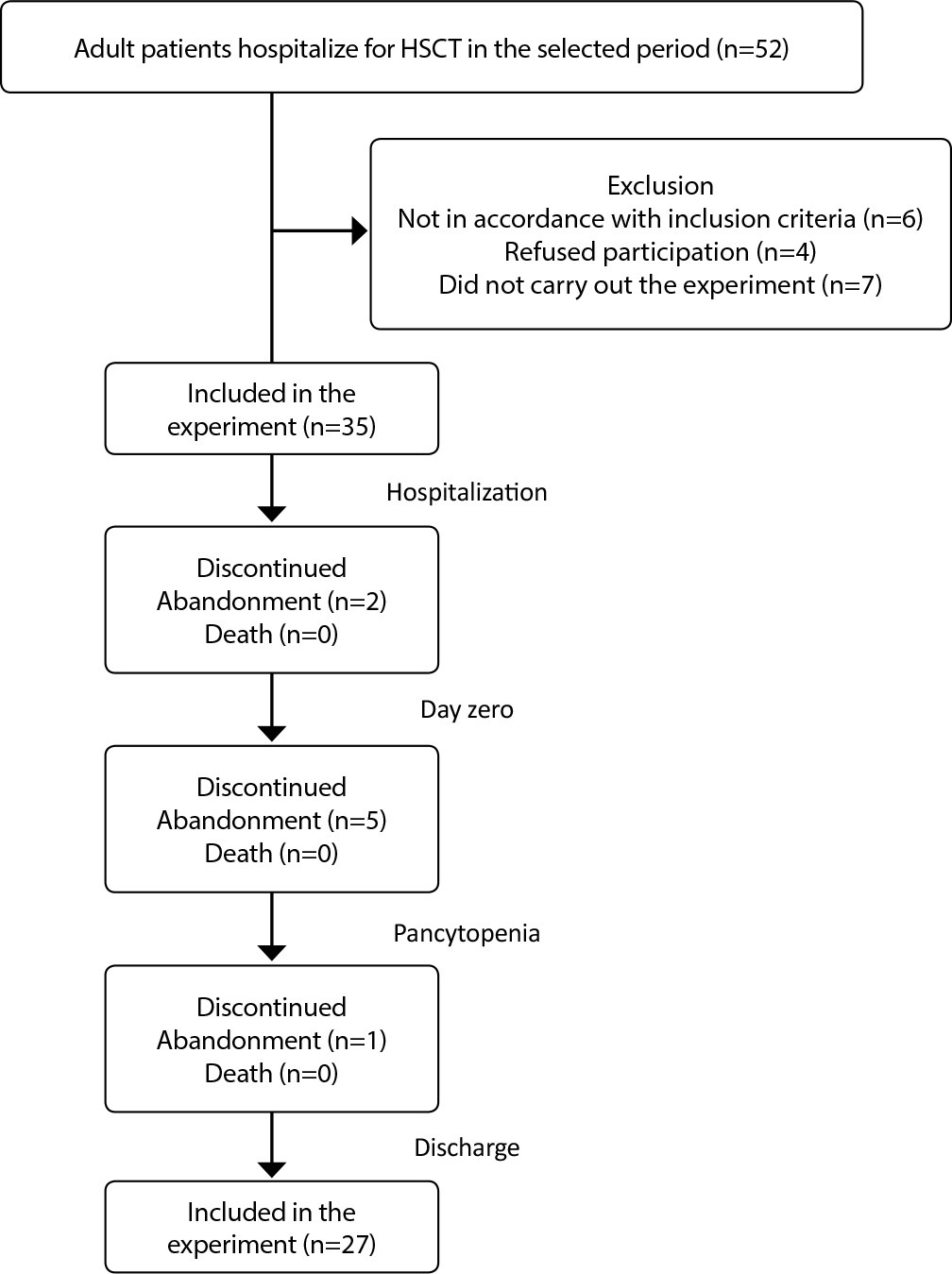
-
ORIGINAL ARTICLE10-17-2022
Semantic validation of educational technology with caregivers of children and adolescents undergoing chemotherapy
Revista Brasileira de Enfermagem. 2022;75(5):e20220294
Abstract
ORIGINAL ARTICLESemantic validation of educational technology with caregivers of children and adolescents undergoing chemotherapy
Revista Brasileira de Enfermagem. 2022;75(5):e20220294
DOI 10.1590/0034-7167-2022-0294
Views0See moreABSTRACT
Objective:
Semantically validate an educational technology with the caregiver of children and adolescents undergoing chemotherapy.
Method:
Methodological study, with a quantitative approach, guided by the theoretical framework of psychometry, developed between March and April 2022, with nine caregivers of children and adolescents undergoing chemotherapy. Educational technology is a digital animation film about the pediatric chemotherapy treatment process, used as a tool for health education.
Results:
In the reliability assessment, the Intraclass Correlation Coefficient was 0.936 [95%CI 0.868-0.984] with p < 0.05 and Cronbach’s alpha of 0.943, demonstrating satisfactory internal consistency. Regarding the semantic analysis, the domains related to objectives, organization, language, appearance, and motivation showed an agreement rate above 80%.
Conclusion:
Educational technology showed satisfactory rates, proving to be a valid, reliable, and important instrument to be used by caregivers of children and adolescents undergoing chemotherapy.
-
10-21-2022
Cancer symptom clusters: from the lab bench to clinical practice
Revista Brasileira de Enfermagem. 2022;75(5):e2022v75n5inov
Abstract
Cancer symptom clusters: from the lab bench to clinical practice
Revista Brasileira de Enfermagem. 2022;75(5):e2022v75n5inov
DOI 10.1590/0034-7167-2022v75n5inov
Views0See moreABSTRACT
Objective:
to present and discuss the advancement of science in symptom management through research involving oncological symptom clusters (OSC).
Method:
a reflective study, supported by the scientific literature on OSC.
Results:
five key points are crucial to advancing the science of symptom management through research involving OSC: definition of OSC characteristics; underlying mechanisms and priority symptom clusters; OSC measurement; targeted and personalized interventions; new analytical strategies.
Final considerations:
a better understanding of the complex connections between different systems and biobehavioral aspects in patients, especially in the field of oncology nursing, is urgent. The study of these interactions has become increasingly promising and emerging for oncology nursing, since therapeutic interventions, whose target is the neuroimmunoendocrine axis, are relevant for personalized care, translating into greater scientific and nurse autonomy to care for patients.
-
ORIGINAL ARTICLE06-24-2022
Prevalence of the Human Immunodeficiency Virus and associated factors in pregnant women in the state of Pará
Revista Brasileira de Enfermagem. 2022;75(6):e20210171
Abstract
ORIGINAL ARTICLEPrevalence of the Human Immunodeficiency Virus and associated factors in pregnant women in the state of Pará
Revista Brasileira de Enfermagem. 2022;75(6):e20210171
DOI 10.1590/0034-7167-2021-0171
Views0See moreABSTRACT
Objectives:
to analyze the prevalence of the Human Immunodeficiency Virus and the associated factors in pregnant women in the state of Pará.
Methods:
retrospective, analytical, quantitative study with a sample of 332 medical records of HIV-positive pregnant women hospitalized at the Referral Maternity Hospital in the state of Pará between 2010 and 2019. Bivariate and multivariate statistical analysis were performed with the variables collected.
Results:
the average prevalence in the period was 2.39% and the Metropolitan Region concentrated 66.87% of cases. There was a strong relationship between the number of antenatal consultations and lack of knowledge of serological status (p value equal to 0.01E-17) variables, and a correlation between the education and number of antenatal consultations variables.
Conclusions:
the increase in the infection rate during the study period revealed the need to intensify health actions, early diagnosis and strategies to improve adherence to antiretroviral treatment for maternal viral suppression and reduction of the risk of vertical transmission, contributing to improve public policies.
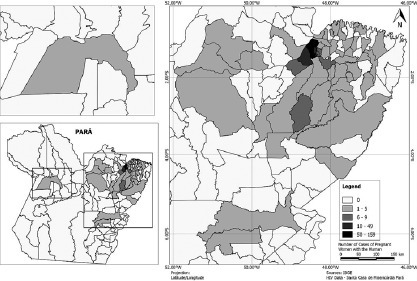
-
ORIGINAL ARTICLE10-03-2022
Evaluation of respiratory complications in a cohort of preterm infants who did not receive palivizumab monoclonal antibodies
Revista Brasileira de Enfermagem. 2022;75(6):e20210362
Abstract
ORIGINAL ARTICLEEvaluation of respiratory complications in a cohort of preterm infants who did not receive palivizumab monoclonal antibodies
Revista Brasileira de Enfermagem. 2022;75(6):e20210362
DOI 10.1590/0034-7167-2021-0362
Views0See moreABSTRACT
Objectives:
to analyze the occurrence of respiratory complications over the first year of life in preterm infants who did not receive palivizumab monoclonal antibodies.
Methods:
analytical retrospective cohort study with preterm infants born between 2012 and 2016 in Uberlândia, state of Minas Gerais, Brazil. Data collection occurred from January to November 2018, by consulting hospital and primary healthcare medical records. Data were processed with the Poisson regression model, with p<0.05.
Results:
of a total of 5,213 preterm births, 504 (9.7%) met the inclusion criteria. The preterm infants in this subset were assisted 2,899 times in primary care, which resulted in 1,098 (37.5%) medical diagnoses, of which 803 (78.5%) involved the respiratory tract. Preterm babies fed on formula milk at hospital discharge had more diagnoses of respiratory diseases. Maternal age (p=0.039), respiratory diagnosis at hospital discharge (p=0.028), and number of sporadic appointments (p<0.001) showed a significant association with bronchiolitis; number of sporadic appointments showed a significant association with occurrence of respiratory diseases; and breastfeeding had a protective effect against the development of bronchiolitis.
Conclusions:
preterm infants who did not receive palivizumab showed a high percentage of respiratory diseases, and breastfeeding helped protect them against bronchiolitis. It is recommended that these preterm babies be monitored in primary health care.
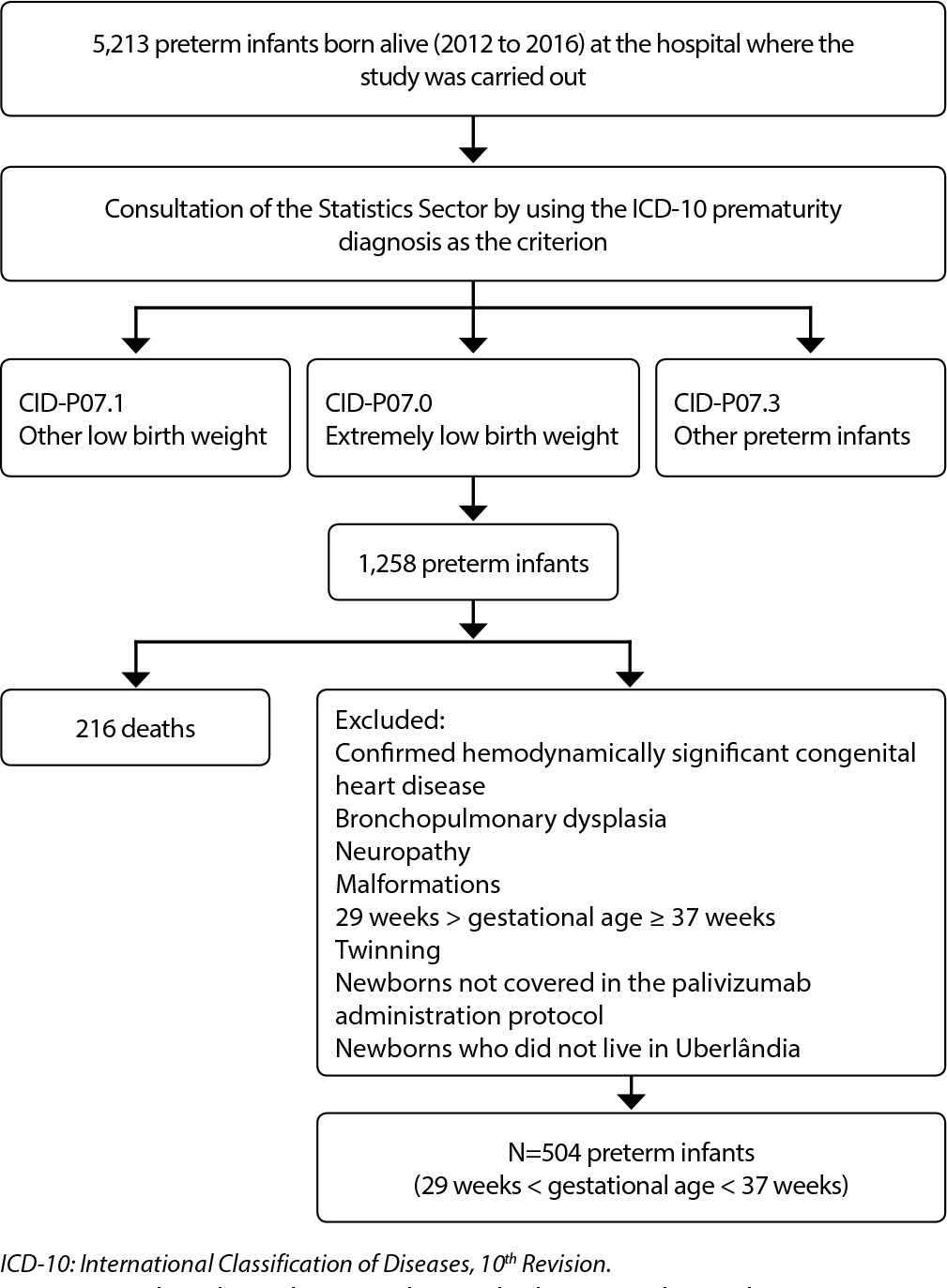
-
ORIGINAL ARTICLE09-09-2022
Palliative care management by caregivers in home care: theoretical validation in a conversation circle
Revista Brasileira de Enfermagem. 2022;75(6):e20210737
Abstract
ORIGINAL ARTICLEPalliative care management by caregivers in home care: theoretical validation in a conversation circle
Revista Brasileira de Enfermagem. 2022;75(6):e20210737
DOI 10.1590/0034-7167-2021-0737
Views0See moreABSTRACT
Objectives:
to present the validation process of a Grounded Theory on the management of palliative care at home by a caregiver of a family member who experiences a death/dying process.
Methods:
a qualitative, explanatory research, which validated a theoretical matrix through a conversation circle containing 15 family caregivers and nine healthcare professionals, in December 2018.
Results:
forty-six propositions were validated regarding family caregivers’ contextual, causal, intervening conditions, consequences and action strategies to deal with the dying and death process of a family member. Conversation circles encouraged dialogue and (re)signification of the senses and knowledge of those involved, proving to be a way of educating and promoting the exercise of citizenship by participants.
Final Considerations:
the conversation circle made it possible for participants to interact and share information and experiences regarding home care for palliative patients and their families.

-
ORIGINAL ARTICLE11-29-2022
Changes implemented in the work environment of nurses in the COVID-19 pandemic
Revista Brasileira de Enfermagem. 2022;75:e20201381
Abstract
ORIGINAL ARTICLEChanges implemented in the work environment of nurses in the COVID-19 pandemic
Revista Brasileira de Enfermagem. 2022;75:e20201381
DOI 10.1590/0034-7167-2020-1381
Views0See moreABSTRACT
Objective:
to describe the changes implemented in the work environment of nurses in university hospitals considering the COVID-19 pandemic.
Methods:
this qualitative and descriptive research was developed from an online survey with 75 nurses from three Brazilian university hospitals. Data processing occurred through textual analysis with the aid of software IRAMUTEQ.
Results:
five semantic classes were obtained: Organization of units for exclusive care of patients with COVID-19; Adaptations in the use of personal protective equipment; Physical structure adaptation; Care flow institution; Increased number of beds and training courses. Final considerations: the results show the effort of healthcare and nursing professionals/managers in the development of structural adaptations and reorganizations of care processes, in the hospital context, to respond with quality and efficiency to the demands arising from the COVID-19 pandemic.
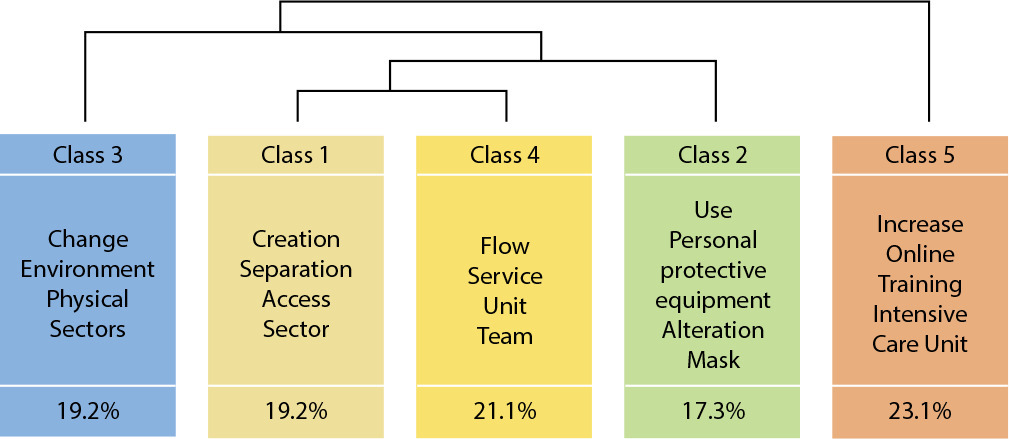
-
ORIGINAL ARTICLE10-21-2019
Permanent education for good practices in the prevention of pressure injury: almost-experiment
Revista Brasileira de Enfermagem. 2019;72(6):1646-1652
Abstract
ORIGINAL ARTICLEPermanent education for good practices in the prevention of pressure injury: almost-experiment
Revista Brasileira de Enfermagem. 2019;72(6):1646-1652
DOI 10.1590/0034-7167-2018-0778
Views0See moreABSTRACT
Objective:
To verify the effectiveness of the educational intervention through the evaluation of nurses’ knowledge about prevention of pressure injury.
Method:
A quasi-experimental study with a single group, carried out with 95 nurses from a teaching hospital in the interior of Minas Gerais, in August and September 2017. As a teaching strategy, the active methodology and hybrid teaching were used, based on the reference of the Method of the Arch of Charles Maguerez. Data were collected from a validated instrument, called the Pieper Knowledge Test, and analyzed by descriptive statistics and Student’s t-test with significance level of p <0.001.
Results:
The mean number of correct answers obtained by the nurses was 78.8% in the pre-test and 88.8% in the post-test, and the difference was statistically significant (p <0.001).
Conclusion:
The educational intervention developed was effective, since it contributed to the improvement of nurses’ knowledge.

-
ORIGINAL ARTICLE12-05-2019
Nurse care for the hospitalized elderly’s spiritual dimension
Revista Brasileira de Enfermagem. 2019;72:236-242
Abstract
ORIGINAL ARTICLENurse care for the hospitalized elderly’s spiritual dimension
Revista Brasileira de Enfermagem. 2019;72:236-242
DOI 10.1590/0034-7167-2018-0685
Views0See moreABSTRACT
Objective:
to analyze the nurse care for the spiritual hospitalized elderly’s dimension.
Method:
a qualitative study, based on Jean Watson’s Theory of Human Caring. The study included 17 nurses working in a geriatric center in Salvador City, Bahia State, Brazil. The collection of testimonies occurred between January and April of 2018, through an interview.
Results:
spiritual care were dialogue, encouragement and respect for religious activities, embracement, empathy. One of the obstacles to providing this care was the lack of preparation in accessing the elderly’s spiritual dimension.
Final considerations:
spirituality is a dimension of human and holistic nursing care. Caring for the spirit contributes to foster transpersonal care. The difficulty may be in the lack of nurses’ preparation. It is necessary that they cultivate and live their own spirituality, transmitting the understanding in each care relationship.
-
EXPERIENCE REPORT04-03-2020
Use of webQDA software on qualitative nursing research: an experience report
Revista Brasileira de Enfermagem. 2020;73(3):e20180411
Abstract
EXPERIENCE REPORTUse of webQDA software on qualitative nursing research: an experience report
Revista Brasileira de Enfermagem. 2020;73(3):e20180411
DOI 10.1590/0034-7167-2018-0411
Views0See moreABSTRACT
Objectives:
to report the user experience of the webQDA software in the support of qualitative data analysis about health literacy of older adults.
Methods:
quasi-experimental research developed from January 2014 to January 2015, with 118 older adults, all of whom were interviewed to assess the level of health literacy. Interviews were carried out before and after four educational interventions, according to Freire’s method named Culture Circle. The interviews were transcribed and entered in the software, which highlighted the analytical categories.
Results:
the systems of sources, interpretative encoding and questioning of the data available in the software allowed the construction of three categories for the literacy levels and four categories for their dimensions.
Final considerations:
We concluded that the webQDA software enables the structured encoding of qualitative materials, ensuring faster and effective management of data with systematization and analytical transparency.

-
03-03-2021
Concept analysis of Perioperative Thirst for the development of a new nursing diagnosis
Revista Brasileira de Enfermagem. 2021;74(1):e20200065
Abstract
Concept analysis of Perioperative Thirst for the development of a new nursing diagnosis
Revista Brasileira de Enfermagem. 2021;74(1):e20200065
DOI 10.1590/0034-7167-2020-0065
Views1See moreABSTRACT
Objectives:
to analyze the perioperative thirst concept for the development of a new diagnostic structure according to NANDA International.
Methods:
a concept analysis study based on the framework proposed by Walker and Avant, instrumentalized through an integrative literature review based on SCOPUS, CINAHL, PUBMED, LILACS, and WOS. The elaboration of the diagnostic structure followed NANDA International guidelines.
Results:
41 studies were analyzed revealing that perioperative thirst is prevalent and intense, having visceral and behavioral attributes as the core of the concept. Antecedents indicate that surgical patients are vulnerable to thirst; and consequents 16 signs and symptoms were organized and model cases were developed. A diagnostic structure has been developed for perioperative thirst.
Final Considerations:
concept analysis allowed language standardization that describes thirsty patients, helping the identification, planning of actions and communication of perioperative nursing care.
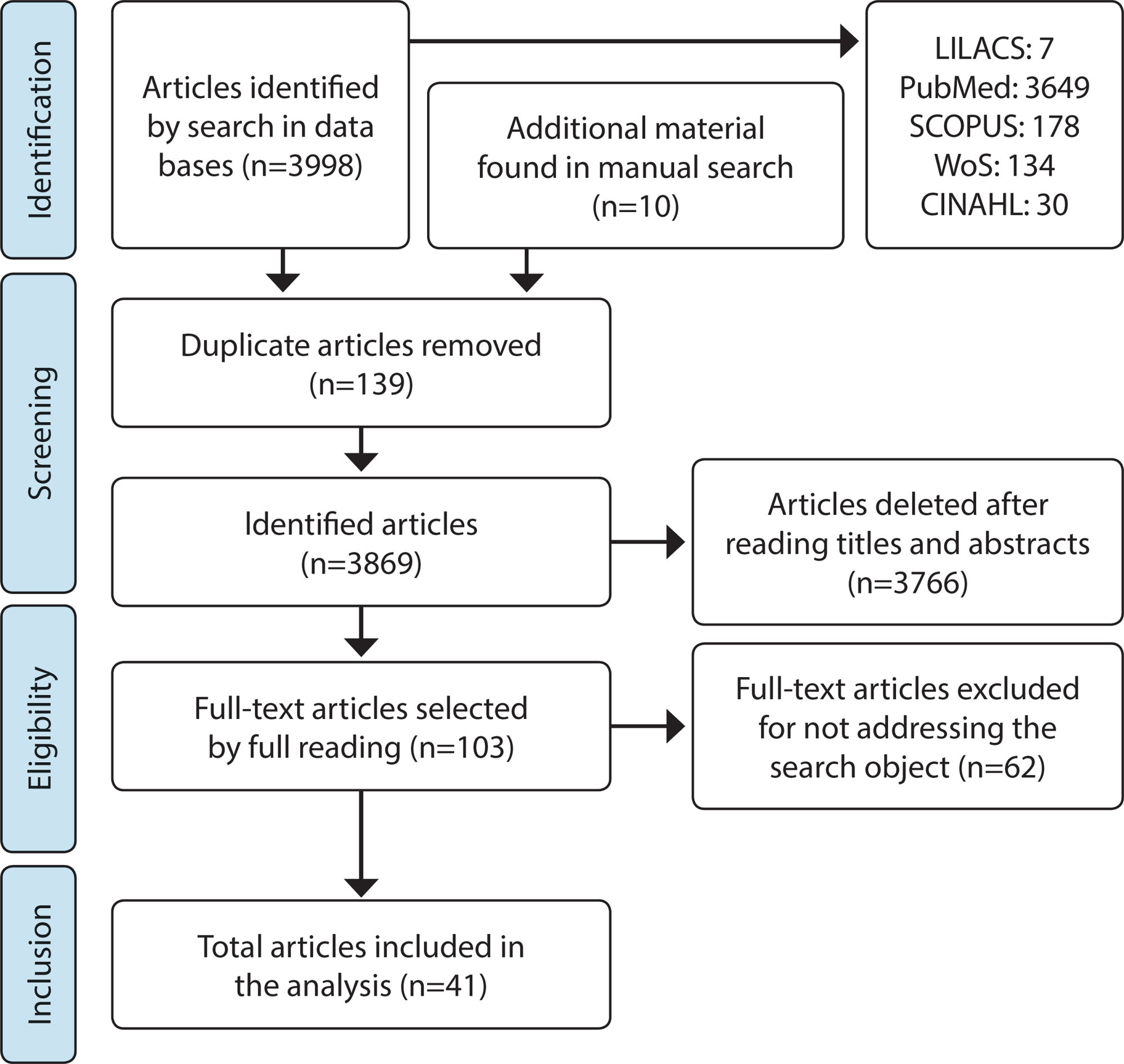
-
REFLECTION05-11-2022
Nursing Process in the Brazilian context: reflection on its concept and legislation
Revista Brasileira de Enfermagem. 2022;75(6):e20210898
Abstract
REFLECTIONNursing Process in the Brazilian context: reflection on its concept and legislation
Revista Brasileira de Enfermagem. 2022;75(6):e20210898
DOI 10.1590/0034-7167-2021-0898
Views0See moreABSTRACT
Objectives:
to reflect on the global understanding of the Nursing Process concept, with emphasis on the Brazilian context.
Methods:
a reflection article, aligned with the vision and expertise of researchers who are members of the Nursing Process Research Network.
Results:
the reflection is presented in two main topics: The evolution of Systematization of Nursing Care X Nursing Process concepts and its consonance with national and international practices, and Brazilian legislation; The Nursing Process concept realignment in Brazilian legislation in line with current care, teaching and research practices. Final Considerations: the reflections were oriented to the Nursing Process’ conceptual, normative and legal issues, including elements of its historical evolution, and, with that, pointed to the need to modify the Brazilian regulation on the Nursing Process.
-
ORIGINAL ARTICLE09-07-2020
Creation and validation of a visual educational technology content for lactation physiology learning
Revista Brasileira de Enfermagem. 2020;73(6):e20190564
Abstract
ORIGINAL ARTICLECreation and validation of a visual educational technology content for lactation physiology learning
Revista Brasileira de Enfermagem. 2020;73(6):e20190564
DOI 10.1590/0034-7167-2019-0564
Views0See moreABSTRACT
Objective:
to create and validate a visual educational technology content for lactation physiology learning.
Method:
a methodological study that contemplated the stages of content creation and validation guided by the conceptual model of Knowledge Translation into action. The creation took place in partnership with the educational technology center of the project’s home institution. The validation was attended by 27 judges with experience in the obstetric, neonatal, pediatric or maternal and child areas and in the theme of breastfeeding.
Results:
an educational technology covered animation and video techniques to locate, respectively, elements of lactation physiology and the population involved. An Overall Content Validity Index of 0.84 was obtained.
Conclusion:
the visual educational technology for lactation physiology learning has been validated in content as a tool to introduce the theme and mediate health education actions that can have a positive impact on breastfeeding.
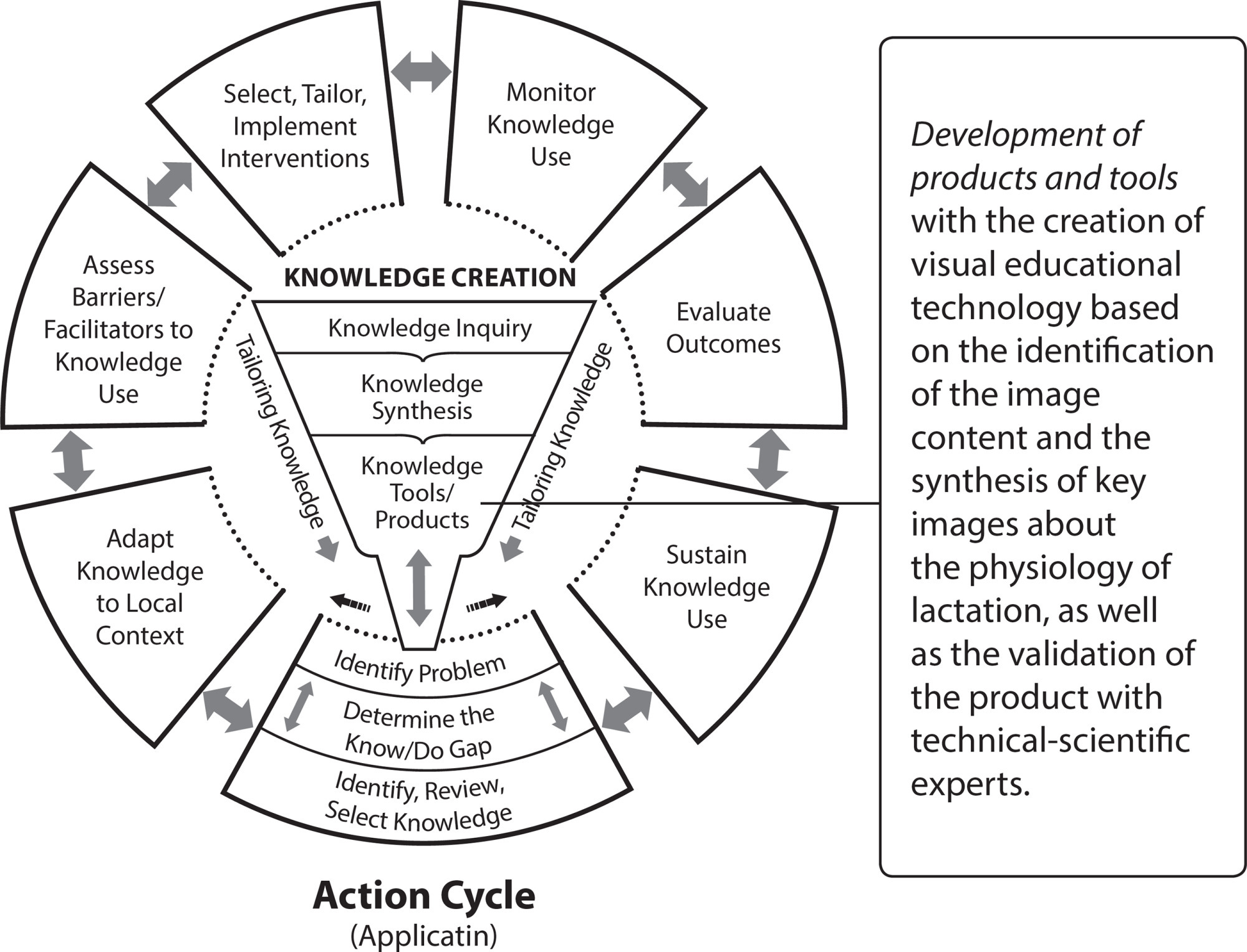
-
ORIGINAL ARTICLE08-20-2021
Risk of suicide among nursing students
Revista Brasileira de Enfermagem. 2021;74(6):e20200867
Abstract
ORIGINAL ARTICLERisk of suicide among nursing students
Revista Brasileira de Enfermagem. 2021;74(6):e20200867
DOI 10.1590/0034-7167-2020-0867
Views0See moreABSTRACT
Objectives:
to identify the risk and degree of risk of suicide in nursing students of a public institution in the countryside of Pernambuco, Brazil.
Methods:
this was a cross-sectional, quantitative research conducted with 150 students. For data collection, a sociodemographic questionnaire and the instrument, M.I.N.I. – Brazilian version 5.0.0 – Module C – Risk of suicide were used. Statistical analyses were performed with IBM(® )SPSS(®), version 23.
Results:
53.3% of nursing students had a risk of suicide, of which 20.7% had a high risk. Moreover, 22.67% reported previous suicide attempt. It is noteworthy that students without a partner have a higher risk of suicide (56.8%) than those with a partner (29.4%).
Conclusions:
it is perceived the need to develop programs that identify students at risk of suicide in higher education institutions, in order to raise awareness of the problem and implement policies to promote mental health in the academia.
Search
Search in:
Nuvem de Tags
Adolescente (85) Atenção Primária à Saúde (239) COVID-19 (91) Criança (91) Cuidados de Enfermagem (269) Educação em Enfermagem (151) Educação em Saúde (139) Enfermagem (930) Enfermagem Pediátrica (86) Estudantes de Enfermagem (77) Estudos de Validação (131) Família (87) Idoso (208) Promoção da Saúde (99) Qualidade de Vida (104) Saúde do Trabalhador (86) Saúde Mental (145) Saúde Pública (82) Segurança do Paciente (150) Tecnologia Educacional (100)



